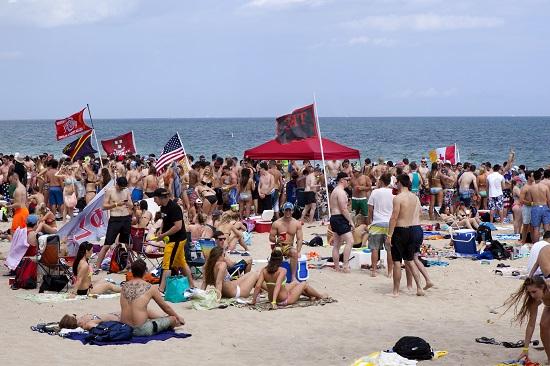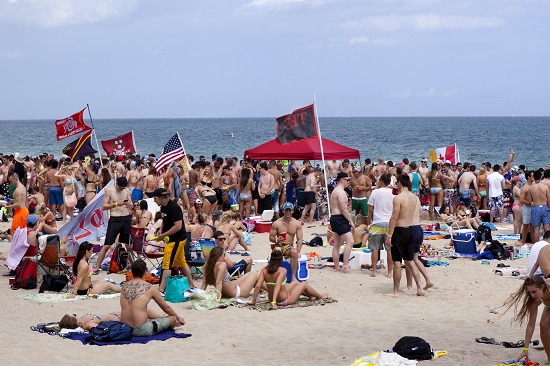

More schools have changed their calendars amid concerns that they would be endorsing the concept of students going away, mingling with others and bringing COVID-19 back to campus – after all colleges’ attempts to create safe environments.
According to travel blog The Points Guy, those concerns are valid. A number of universities saw massive outbreaks among their student and employee population after students traveled over Spring Break 2020, and transmitted the virus across campus upon their return.
In some ways, having students stay onsite, rather than allowing them (even if not outright encouraging them) to disperse into the wider community creates its own “bubble” that was successfully used for professional basketball and hockey.
But while cancelling spring break makes sense from a health perspective, its ramifications are not good for the financial health of the destinations that traditionally host such activity. Many spring break destinations’ tourism officials have been counting on the influx of students to help make up for the shortfalls caused by all the cancellations of events and vacations in 2020.
An article in Free Enterprise notes that John Laurie, a grad student at the University of New Orleans, went so far as to write his dissertation on the phenomenon. In “Spring Break: The Economic, Socio-Political, and Public Governance Impacts of College Students on Spring Break Host Locations,” Laurie notes that the economic impact of the influx of students cannot be downplayed, with young people pumping some $1 billion each year into Texas and Florida’s economies alone.
Another loser in the cancellation is event owners who count on students to be out of school and willing to travel to participate. (Texas and Florida, in fact, are enormous destinations for tournaments right now). College tournaments for spring sports (including those run by the NCAA) often take place in March and April – peak spring break times. Also worth noting is the fact that NCAA still has some championships to reschedule.
But just as concerning is the youth market. Many school systems are identifying the week around Easter (which falls on April 4 this year) as their spring break, with many stating the break will run from Thursday, April 1 to Tuesday, April 6 – although those dates vary. Some states have shortened the break in recognition of the fact that students are learning virtually or have hybrid virtual/in-person schedules.
Youth events – baseball, softball, lacrosse, swimming, spring soccer, beach volleyball and others, make up a huge portion of the travel economy during the spring period overall. GSL Tournaments, for example has 8U-14U baseball tournaments in 2021 from January through June, including a heavy concentration from March through the end of April. In Richmond, Virginia, the Jefferson Cup has soccer tournaments throughout March. And MyHockeyTournaments has a list of ice hockey events nationwide stretching from fall to spring. The search engine, High School Tournaments, also shows an enormous array of tournaments coast to coast in all sports.
Meanwhile, students at the college level are pushing back against the cancellation of spring break, stating that their mental health is at stake. Many students, say the magazine, Teen Vogue, have protested long and loudly to their school administrations.
“I know [the administration] thinks that we just want to go party or something but it’s not true,” Brandon Moreno, the Washburn University Student Government Association’s diversity and inclusion director, said. “We want this because we are actually struggling and just need mental health days.”
Moreno organized a petition for students who couldn’t attend a meeting with administrators. Many students also spoke at the meeting to share their personal experiences. According to Moreno, students spoke about increased anxiety and depression in the fall semester and even “suicide attempts that had been made.”
Many schools, in recognition of students’ plight, have added one to two free days to the spring schedule, but students say it is not enough.
Unfortunately, the statistics are against them. The blog, Inside The Magic, notes that Universal Orlando Resort has said it expects unprecedented crowds this spring. One of the factors, it noted, was “pandemic fatigue.” The anticipated demand may result in some attractions opening ahead of schedule in order to accommodate the crowds.
If schools nationwide elect to keep students in school during the traditional spring break time in the interest of keeping athletes well, there are a few options (apart from cancelling tournaments outright, which is never preferable):
- Keeping tournaments scheduled as they currently are and not changing anything (after all, many tournaments are held over weekends, allowing students and their families to get away without as much out-of-classroom time, plus the growing trend of “schoolcations” can help with lessons while kids are out of town)
- Keeping tournament dates as they are and moving the tournament to states/jurisdictions where the rules against gatherings are less strict (this has already been the case with many event owners in restrictive California; however, some destinations have pushed back)
- Moving tournaments to those other states/jurisdictions but changing dates (to avoid conflicts with events already scheduled in those areas)
- Changing tournament dates to summer and hosting events at that time
While there is no perfect scenario, tournament directors should recall that large gatherings have previously been linked to everything from mumps to the flu – and everything in between, including measles.

